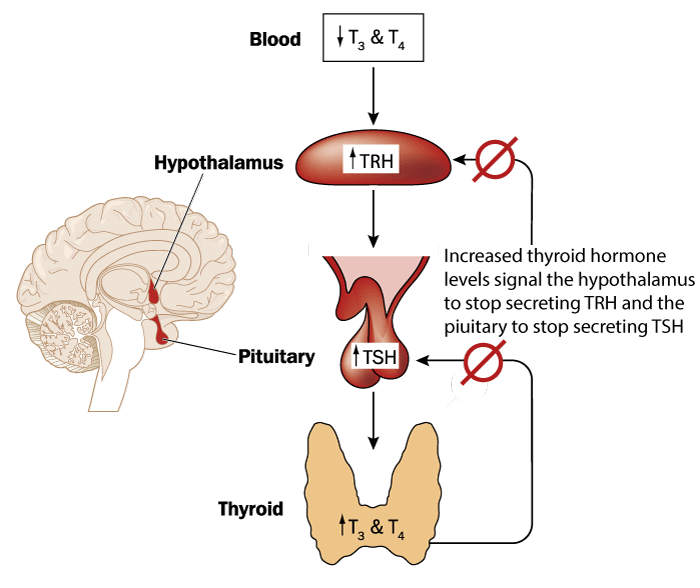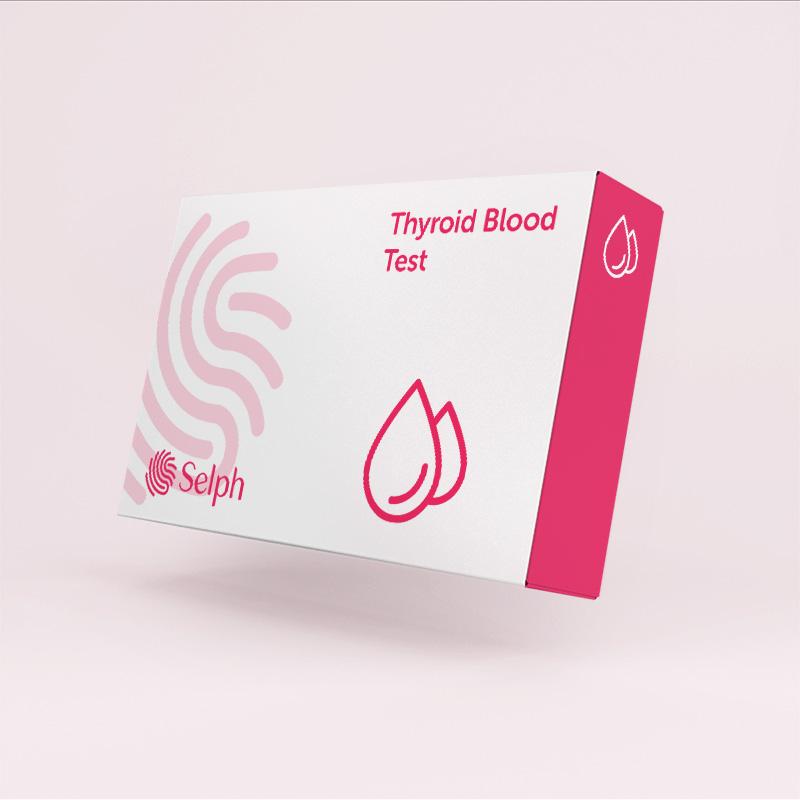How do you test your thyroid and what do your thyroid test results mean?
Published
Key Article Takeaways
- Thyroid problems are common, happen at any age and impact nearly every part of your health from your skin to your gut.
- An underactive thyroid can cause weight gain, tiredness, constipation and dry skin.
- An overactive thyroid can cause weight loss, diarrhoea, hair loss and anxiety.
- A thyroid test should measure your TSH level and potentially thyroid hormone levels and thyroid antibodies.
You can quickly and easily get a Thyroid Test today.
Around 1-in-8 people will develop a thyroid gland problem during their lifetime1. Thyroid diseases can affect pretty much every part of your health. But what is your thyroid and what happens when something goes wrong? How do you test your thyroid and how do you interpret your thyroid test results? Let’s dive in!
1-in-8 people will develop a thyroid gland problem during their lifetime.
What is the thyroid gland and what does it do?
Your thyroid gland is a small butterfly-shaped organ at the base of your neck. It produces thyroid hormones that affect every major part of your health, from your skin and gut to your mood and energy levels.
You can think of your thyroid gland as the thermostat for your body’s metabolism. High thyroid hormone levels make everything run faster and hotter, breaking down fat and pushing glucose into the bloodstream. In contrast, low thyroid hormone levels make your body run slower and colder, raising cholesterol and lowering blood sugar.
The hormones produced by the thyroid are triiodothyronine (T3) and thyroxine (T4). T4 is the major hormone produced by the thyroid gland but it’s actually less potent than T3. Most T4 is converted into T3 in your bloodstream, before it reaches your organs and tissues.
How does your thyroid gland work?
Your thyroid’s activity is controlled by the hypothalamic-pituitary-thyroid axis, which acts as a negative feedback loop (see Figure 1) - let’s break it down.
- Your hypothalamus is a part of your brain which controls the first step of this pathway. Low levels of thyroid hormones in your blood signal your hypothalamus to produce thyrotropin-releasing hormone (TRH).
- TRH then stimulates your pituitary gland, also in your brain, to release thyroid-stimulating hormone (TSH).
- TSH - as the name suggests - stimulates your thyroid gland to secrete T4 and a bit of T3.
- To complete the negative feedback loop, these thyroid hormones then signal back to your hypothalamus and pituitary gland to prevent the release of TRH and TSH and ultimately lower the hormone production from the thyroid gland itself.
So when you’ve got low thyroid hormones in your blood, your hypothalamus makes more TRH and your pituitary gland makes more TSH to stimulate your thyroid to produce more T4/T3. Once your thyroid hormones are at a high enough level in your blood, your hypothalamus and pituitary gland are told to stop stimulating your thyroid and hormone production decreases.

What can go wrong with your thyroid gland?
Women are up to 10 times more likely to be affected than men
Thyroid problems can affect many different aspects of your body, such as your mood, appetite, skin, weight and bowel habits. Thyroid disorders are generally divided depending on whether thyroid hormone levels are low or high into under-active and over-active thyroid disorders. Having an underactive thyroid is also called hypothyroidism and having an overactive thyroid is also called hyperthyroidism.
Underactive thyroid disorders are much more common than overactive thyroid disorders. In both cases, women are up to 10 times more likely to be affected than men.
In the UK, the commonest cause of both under- and over-active thyroid diseases are autoimmune conditions. People with other auto-immune conditions such as type 1 diabetes, vitiligo and coeliac disease are at higher risk of thyroid problems due to being more susceptible to autoimmune diseases.
Let’s explain the causes and symptoms of an over- and under-active thyroid gland.
Underactive thyroid or Hypothyroidism
An underactive thyroid is the most common thyroid condition, estimated to affect up to 5% of the population2. If you have an underactive thyroid, or hypothyroidism, your thyroid gland isn’t producing enough thyroid hormone.
Because of this, your hypothalamus and pituitary gland will be signalled to release their thyroid-stimulating hormones. Your pituitary gland will release TSH in the effort to make more thyroid hormone. As a result, you’ll have a high TSH level.

Causes of an underactive thyroid gland
In the UK, the commonest causes of an under-active thyroid are autoimmune diseases. In particular, a condition called Hashimoto's thyroiditis, where your immune system attacks the thyroid gland. This disease runs in families and you’re more likely to develop it if you’re type 1 diabetic.
However, worldwide, the commonest cause of an underactive thyroid is actually iodine deficiency. Iodine deficiency is not so much a problem in the UK, but a third of the world’s population live in iodine-deficient areas. (It’s worth noting that too much iodine can also cause thyroid health problems).
Symptoms of an underactive thyroid gland
With an underactive thyroid, your thyroid gland isn’t producing as much thyroid hormone as it should be. Many different organs from your bowels to your skin can be affected.
Symptoms of an underactive thyroid (hypothyroidism)
- Feeling cold
- Tiredness and fatigue
- Dry skin and hair
- Constipation
- Weight gain
- Low mood
What is subclinical hypothyroidism?
Subclinical hypothyroidism (SCH), also called mild thyroid failure, is an early form of an underactive thyroid and affects 1-in-10 people. You’ll have slightly higher TSH levels than normal but your thyroid hormone levels (e.g. T4) will be within the normal range (although often towards the lower end of normal).
Having subclinical hypothyroidism increases your risk of developing an underactive thyroid gland in the future. About 1-in-20 people with subclinical hypothyroidism go on to develop overt hypothyroidism every year. Risk of progression is higher if you’re positive for thyroperoxidase antibodies (more on this below).
Subclinical hypothyroidism can also be temporary and about 60% of people revert to normal thyroid function within 5 years.
It’s particularly important to know if you have subclinical hypothyroidism and you’re pregnant or planning to become pregnant. Pregnancy weakens your immune system and can cause (usually temporary) thyroid issues. But if you become pregnant you’re more likely to develop SCH. SCH is a risk factor for miscarriage in the first 20 weeks of pregnancy3. Getting tested and treated early can reduce the risk of complications. If you’re planning to conceive, normal thyroid function should be a priority.
Overactive thyroid or hyperthyroidism
If you’ve got an overactive thyroid, or hyperthyroidism, your thyroid gland is producing too much thyroid hormone. You’ll have low levels of TSH because of the negative feedback effect of high thyroid hormone levels on the pituitary gland reducing TSH production.
Causes of an overactive thyroid
The most common cause of an overactive thyroid is an autoimmune condition called Graves’ disease. In Graves’ disease, your immune system produces an antibody called thyroid-stimulating immunoglobulin (TSI). TSI directly stimulates your thyroid to produce more hormone, independent of your TSH. You’ll have high levels of T3 and T4 as a result.
Women are 10 times more likely than men to have Graves’ disease.
Symptoms of an overactive thyroid
When your thyroid is working on overdrive, symptoms may include feeling like your whole body is running faster and hotter.
Symptoms of an overactive thyroid (hyperthyroidism)
- Feeling hot and sweaty
- Difficulty sleeping
- Hair thinning
- Diarrhoea
- Weight loss
- Anxiety
- Tremors
How can you test your thyroid function?
Given that thyroid disorders are so common and can cause all sorts of vague symptoms, it’s important to get a thyroid test at least every couple of years. A thyroid function test can include a few different markers which we’ll go through:
Thyroid stimulating hormone (TSH)
If your pituitary gland is producing high levels of TSH, this indicates an underactive thyroid (because your body is trying to produce more thyroid hormone). Conversely, low TSH indicates an overactive thyroid (because your body is trying to reduce thyroid hormone levels).
Checking your TSH level is the most important first step in assessing your thyroid function and if your TSH level is normal, we can be confident that you don’t have an issue with your thyroid gland. So you can think of TSH as a kind of thyroid “screen”. If levels are normal then no further thyroid tests are needed but if your levels are high or low then you need to go on and do more in depth thyroid tests.

Thyroid hormones
If your TSH levels are high or low, we go on to check at least your thyroxine level. This is usually done by measuring your “free” thyroxine level or “fT4”. Free thyroxine is the thyroxine in your blood that is not stuck to any other proteins and is “free” to be used by your body. fT4 represents about 1% of your total T4. The rest of your body’s thyroxine is actually attached to proteins and unavailable.
If we specifically want to look at the thyroid gland then we check both TSH and T4 together, as in our Thyroid Blood Test. These two measures are all that needs to be tested to find out if you’ve got an over- or under-active thyroid gland.
Triiodothyronine (T3) is the other major hormone produced by your thyroid gland. T3 tests may also be included in panels which check your T4 and/or TSH, but the free T4 tests are more important. This is because T4 is the major hormone produced by the thyroid gland so it's the most direct measure of what the thyroid is producing. However, T3 tests can be also useful and help to diagnose thyroid conditions.
How do you interpret thyroid hormone levels?
Putting it all together, we can interpret your thyroid hormone levels as follows:
| TSH level | T4 (and T3) level | Interpretation |
| Normal | Normal | No thyroid disease |
| High | Normal | Subclinical hypothyroidism |
| High | Low | Hypothyroidism - usually Hashimoto’s thyroiditis |
| Low | High | Hyperthyroidism - usually Graves’ disease |
| Low | Normal | Subclinical hyperthyroidism |
Thyroid antibodies
If you have an under- or over-active thyroid gland, you should test for certain thyroid antibodies which can help indicate whether you have an autoimmune thyroid condition.
Thyroid peroxidase antibodies (or thyroperoxidase antibodies)
Thyroperoxidase is an enzyme produced by the thyroid gland. Around 95% of people with Hashimoto’s thyroiditis are positive for thyroid peroxidase antibodies. About 70% of people with Graves’ disease also have thyroperoxidase antibodies4.
If you have thyroperoxidase antibodies and subclinical hypothyroidism then you’re at higher risk of developing overt hypothyroidism in the future.
Thyroglobulin antibodies
Thyroglobulin antibodies are directed against a protein in the thyroid gland called thyroglobulin. Raised thyroglobulin antibody levels can be seen in Hashimoto’s thyroiditis and thyroid cancer.
Thyroid-stimulating immunoglobulin or thyroid-stimulating antibodies
These antibodies are typically associated with Graves’ disease. The antibodies act like TSH and stimulate the thyroid gland to produce thyroid hormones. About 90% of people with Graves’ disease will be positive for thyroid-stimulating antibodies.
When should you test your thyroid health?
If you don’t have any thyroid symptoms
If you don’t have symptoms but are looking to “screen” your thyroid health, guidance suggests that you test yourself at least every 5 years from turning 355. Your thyroid health can cause very subtle or vague problems that come on slowly, so you might not notice them. This is why we include a thyroid gland check with TSH in our General Health Blood test which we recommend is taken yearly.
In particular, you should be keeping an eye on your thyroid if you have any other autoimmune conditions that make you more susceptible such as type 1 diabetes or coeliac disease, or if a close relative has thyroid disease.
Remember that thyroid problems can develop at any age so just because you’ve had normal results in the past, it doesn’t mean you won’t develop thyroid disease in the future. If you’re over the age of 60 you’re more at risk. If you’re a woman, you’re also much more likely to develop thyroid disease.
If you have thyroid symptoms
You should check your thyroid if you have symptoms that could be caused by thyroid disease, like tiredness, unexplained weight changes or changes in your bowel habit. Our Quick & Easy Thyroid Test measures your TSH and free T4 and is ideal.
Because thyroid symptoms can be quite vague and affect any organ, it’s not always easy to know that a particular symptom is related to your thyroid. This is why we include a thyroid check with TSH in our test panels looking at gut symptoms and tiredness.
If you have bowel symptoms, such as constipation or diarrhoea, you should consider using our Complete Gut Health Test & Symptom Screen to look for thyroid problems along with bowel inflammation, coeliac disease, infections and bowel cancer.
If your main symptom is tiredness and fatigue, then our Tiredness & Low Energy Blood Test panel tests for vitamin deficiencies and inflammation along with your thyroid health.
Get tips on better health
Sign up to our emails on the better way to better health.
We'll keep you up-to-date with the latest research, expert articles and new ways to get more years of better health.








